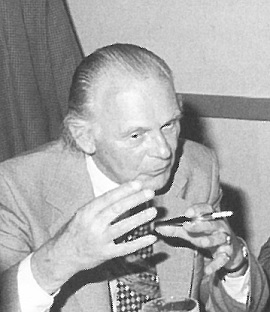DDr. Klaus Hornig

Personalia
Born:
Died:
Profession:
Persecution:
Imprisonment 28.04.1942 - 26.09.1944, Buchenwald concentration camp 26.09.1944 - 28.04.1945
KZ Number:
Memberships
Curriculum Vitae
ORNIG was born in the Silesian town of Schweidnitz [Swidnica], the son of the dentist Dr. Fritz Hornig. He attended grammar school here and, after graduating from high school, began studying law and political science at the University of Breslau, where he was accepted into the Winfridia student fraternity in 1928. He continued his studies in Königsberg in East Prussia, where he joined the Tuisconia student fraternity. In 1930, he joined the Prussian police as an officer candidate. In 1938/39 he was able to complete his law studies, first in Munich and then in Innsbruck. On March 14, 1939, he passed the bar exam at the Higher Regional Court in Innsbruck.
As a police officer candidate, he was called up to the later infamous Police Battalion 306 in Lublin (Poland) on Heinrich Himmler's orders. The Majdanek concentration camp has been located here on the south-western outskirts of the city since 1941. He was deployed as a company commander in the Ukraine. On November 1, 1941, he was ordered to shoot Jews and Russian political commissars (in accordance with the commissar decree of October 1941). He refuses this order, citing Section 47 of the Military Criminal Code, which gives him and the troops under his command the right to "refuse an order if he recognizes a crime in it". As a result, he was immediately suspended from duty and transferred back to his home base in Frankfurt am Main, Germany. He was arrested by the Gestapo on April 28, 1942 and charged with "undermining the discipline of men in the German Wehrmacht", interrogated and held in various prisons. On May 11, 1942, the first trial takes place before the SS and Police Court XXII in Kassel. The sentence of six years and seven months imprisonment is initially suspended due to Klaus Hornig's objection, on condition that he "not speak to anyone about his experiences at the front". SS-Obergruppenführer [=General] Josias Erbprinz zu Waldeck und Pyrmont is the chief judge at the SS and Police Court of Military District IX, based in Kassel and later Weimar/Buchenwald. Klaus Hornig does not abide by the order to remain silent and reports in detail in Frankfurt/M. about everything he experiences at the front. This is reported by an acquaintance who is an honorary member of the SS Security Service [SD] [i.e. an informer]. As a result, he was given a protective custody order and committed to the Buchenwald concentration camp on September 26, 1944.
Klaus Hornig writes about this in his previously unpublished "Memoirs":
"It was a pleasure for me to meet my Austrian Cartell brothers, such as Heinrich Prinz zu Schwarzenberg and others, again in Buchenwald. Apart from a few Catholic and Protestant clergymen, there were hardly any German academics to be found."
A second trial was held here in February 1945. On March 15, 1945, Klaus Hornig was again found guilty of "military disobedience and military crimes" and ordered to remain in a concentration camp. The reasons given included:
"All police officers deployed in Poland were expressly forbidden to talk about their experiences on duty there. The accused was also aware of this confidentiality obligation. ... Under these circumstances, a special situation of danger for the security of the Reich was created. Even in his defense, the accused did not have the right to describe his experiences to third parties in this form."
[Prosecution of the SS and Police Court XXII - Ref: II 339/44 of 8.2.1945].
On 31.3.1945, Erbprinz zu Waldeck takes up his official residence in the commandant's office of the Buchenwald concentration camp and from here commands the evacuation of the camp ordered by Heinrich Himmler. From April 5, 1945, the camp was partially evacuated and transferred to other concentration camps on foot or in freight cars, except for inmates who were not fit for transport. The confusion before the camp was captured by the Americans saved Klaus Hornig from being shot, as the SS indiscriminately shot "unpleasant witnesses" during these days.
After being liberated from the Buchenwald concentration camp, Klaus Hornig is held in various internment camps by the Americans so that he can be questioned as a witness to war crimes committed, such as mass shootings in the East. After his release from the internment camp, the former Dachau concentration camp, in September 1947, he sought compensation for the injustice he had suffered on the one hand and career advancement on the other. Although he was promoted to lieutenant colonel in the police in 1953, this also meant that he was temporarily retired, "while others were promoted without further ado", as he noted bitterly. He was denied a return to active police service, and his application for the Federal Border Guard and later for the newly established German Armed Forces was rejected.
Places
Persecution:
Residence:
Citations
Krause, Peter/Reinelt, Herbert/Schmitt, Helmut (2020): Farbe tragen, Farbe bekennen. Katholische Korporierte in Widerstand und Verfolgung. Teil 2. Kuhl, Manfred (ÖVfStG, Wien) S. 134 - 136.; Photo: OVfStg
